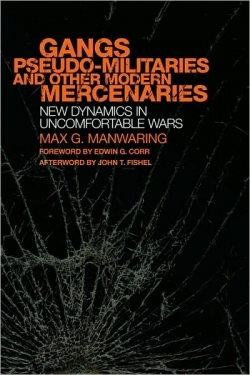Gangs, Pseudo-Militaries, and Other Modern Mercenaries
New Dynamics in Uncomfortable Wars
“Ripped from the headlines,” this book connects current and recent events as seemingly disparate as the murderous conflicts between narco-traffikers on the streets of Juarez, Mexico, and Israel’s 2006 defeat in Lebanon by the “supergang” Hezbollah. These conflicts typify many other struggles around the world, according to Max Manwaring, a senior professor at the Strategic Studies Institute of the US Army War College, and they pose a serious challenge to large-army military tactics by utilizing the “art of war” as described in the writings of Sun Tzu, Machiavelli, and Lenin.
Weak governments, unable to provide social services or juridical protection, allow “gangs” of all stripes to move into local power vacuums with only a small cadre of trained leaders who gain control through “voluntary-coercive” methods such as donating money to political campaigns, building roads and schools, or distributing propaganda, and who are also willing to conduct “reprisal and terror” operations that inflict maximal damage with little risk or cost. Ultimately they move into a final phase of total war in which victory is sought “by any means necessary.”
Manwaring’s study shows how the Leninist tactics that won the Russian Revolution have been applied by financially-motivated criminal organizations who want to operate unhindered by legitimate governments as well as by organizations with radical ideologies, such as Al Qaeda, the Taliban, and Hugo Chavez’s government in Venezuela. Each group works toward short-term goals through methods that may seem random and unrelated but that are non-etheless intended to lay the foundation on which long-term victory rests. Such goals are often multi-generational because success depends on meticulous planning by a dedicated elite and requires a post-victory strategy for immediately assuming all functions of legitimate government.
For example, Manwaring illustrates how Venezuelan President Hugo Chavez is beginning a long-term process for “the liberation of Latin America” by consolidating his “base position…taking a relatively low revolutionary profile, and waiting for a propitious time to begin the expansion of the revolution on a supranational Latin American scale.” Seeking to undermine the legitimacy of “US economic and political domination of the Americas,” Chavez is implementing “a long-standing methodology of the weak against the strong” that is echoed in the strategies of other state and non-state organizations worldwide.
Manwaring’s analysis is both thorough and provocative: American foreign policy must undergo a “paradigm shift” that combines new theories of engagement with more military-civilian cooperation and a “‘self-help’ doctrine to support…free peoples and legitimate partners” in their efforts to prevail over “armed minorities, organized criminals, narco-terrorists, ethnic cleansers, and outside aggressors.”
President Obama should read this book; indeed, one hopes he already has.
Reviewed by
Elizabeth Breau
Disclosure: This article is not an endorsement, but a review. The publisher of this book provided free copies of the book to have their book reviewed by a professional reviewer. No fee was paid by the publisher for this review. Foreword Reviews only recommends books that we love. Foreword Magazine, Inc. is disclosing this in accordance with the Federal Trade Commission’s 16 CFR, Part 255.

